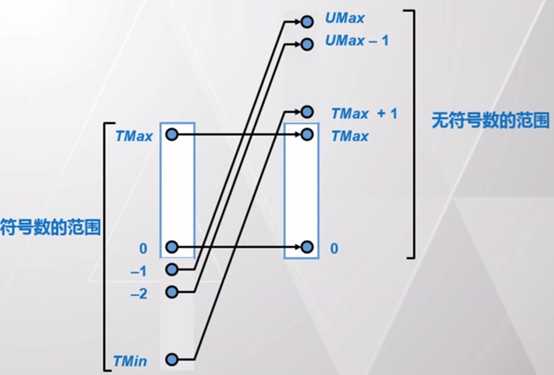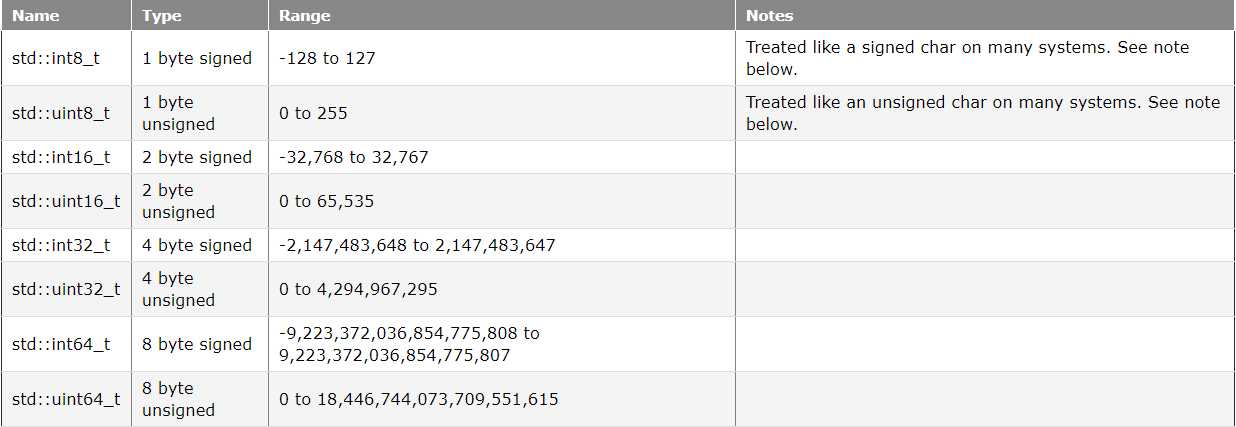标签:title sizeof ini cpp rap mamicode 跨平台 table 架构
| Size/Type | Range |
|---|---|
| 1 byte signed | -128 to 127 |
| 2 byte signed | -32,768 to 32,767 |
| 4 byte signed | -2,147,483,648 to 2,147,483,647 |
| 8 byte signed | -9,223,372,036,854,775,808 to 9,223,372,036,854,775,807 |
singed integers保存数字范围如上,对于超出数字范围的数,其最终数值是截断处理。
#include <cstdint> #include <iostream> int main() { std::int8_t a = 280;//24 std::int8_t b = 384;//-128 return 0; }
int8_t是C++ 11 推出的类型,定义在头尾件<cstdint>中。
280的二进制 1 0001 1000
384的二进制 1 1000 0000?
另外,整数除法,其结果也是整数。如果算出来是1.6,-1.6这样的非整数,结果需去掉小数部分。结果符号同分子
#include <iostream> int main() { std::cout << 8 / 5;//1 return 0; }
| Size/Type | Range |
|---|---|
| 1 byte unsigned | 0 to 255 |
| 2 byte unsigned | 0 to 65,535 |
| 4 byte unsigned | 0 to 4,294,967,295 |
| 8 byte unsigned | 0 to 18,446,744,073,709,551,615 |
C/C++下面unsigned,signed存储数字的个数是相同的,但是表示范围不同。unsigned数存在 wrap around 问题。以8bit整数为例,unsigned数最大255,那么他可以保存280吗?答案是可以。但是此时会出现wrap around问题,实际保存的数会是24。计算方式如下: 8bit最大数值+1为256,280/256=1...24
#include <iostream>
int main()
{
unsigned short x = 65535; // largest 16-bit unsigned value possible
std::cout << "x was: " << x << ‘\n‘;
x = 65536; // 65536 is out of our range, so we get wrap-around
std::cout << "x is now: " << x << ‘\n‘;
x = 65537; // 65537 is out of our range, so we get wrap-around
std::cout << "x is now: " << x << ‘\n‘;
return 0;
}
除此之外,使用unsigned保存负数,实际数值都是很大的整数。这会导致while(a1-a2>0); 是个死循环(a1,a2是unsigned数)

在Visual Studio中,integer占用内存大小是不缺定的,这取决于你计算机(或IDE)所使用的架构。为什么就不能把表示integer的位数定死呢?简言之,早期计算机速度较慢,性能称为主要关切对象。C/C++的做法是把确定integer占用多少bit的工作交给编译器去确定,编译器来决定到底多少bit表示integer才能在目标计算机架构下呈现最大性能。对于如今计算机,硬件环境得到极大改善。这时候integer还是不确定就有点蛋疼了,这导致你代码的行为也可能是不确定的。在一种架构下运行良好的代码可能在另一种架构下就出问题了。为了保证跨平台的兼容性,C99提供了一组 fixed-width integers (定义在<stdint.h>或者<cstdint>文件中)。C++ 11 也支持这一标准。

fixed-width integers有两个弊端:
①部分平台或架构可能不支持fixed-width integers
②即使支持fixed-width integers,其性能可能没有build-in的类型好
为了克服fixed-width integers的弊端,C++ 11有引入fixed-width integers
std::int_fast#_t std::uint_fast#_t
std::int_least#_t std::uint_least#_t

大多数编译器把std::int8_t and std::uint8_t(相应的fast,least,fixed-width)与 signed char 和 unsigned char 同样对待。这会导致std::cin 和std::cout 表现出你预料之外的结果。
#include <cstdint> #include <iostream> int main() { std::int8_t a = 280;//24 std::int8_t b = 384;//-128 return 0; }
在大多数系统上,程序输出 A,但是个别系统可能输出65.
因此,最好的方法就是避免使用 std::int8_t and std::uint8_t 以及相应的 fast,least,fixed-width。改为使用std::int16_t or std::uint16_t
#include <iostream> int main() { std::cout << sizeof(int); return 0; }
上述代码在我都环境下输出4
我们都知道sizeof会返回一个类型占据内存大小,返回值是个具体数值,这个数值的类型就是size_t。sizt_t可以理解成unsigned int,具体多少位,看具体实现。
不光sizeof返回值是size_t,其他表示类型或者对象长度的地方都会使用size_t
一般而言,16bit即可覆盖你想表示的数时,你大可以不必关系上面讲的问题。
如果为了性能,建议使用std::int_fast#_t
如果为了省内存,建议使用std::int_least#_t.
避免使用unsigned,8-bit fixed-width integer types,compiler-specific fixed width integers -- for example, Visual Studio defines __int8, __int16, etc…
标签:title sizeof ini cpp rap mamicode 跨平台 table 架构
原文地址:https://www.cnblogs.com/kelamoyujuzhen/p/11215461.html